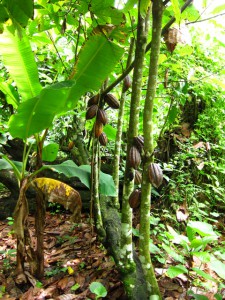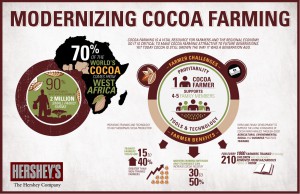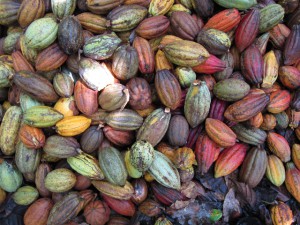On January 30th, after years of being targeted by organized consumer Fair Trade actions including creative holiday kid’s actions, brand jamming contests, protests and rallies at flag ship Hershey store and shareholder meetings, Hershey has finally made a move!
The Raise the Bar Hershey’s campaign which has been calling on Hershey to go Fair Trade, collected over 100,000 petition signatures through Change.org and other sources, and organized petition deliveries, shareholder resolutions, and Facebook actions to blanket Hershey’s wall with messages.
Two days ago Hershey’s announced that it will make a commitment to purchasing Rainforest Alliance Certified cocoa for all of its Bliss Chocolate products and it will invest $10 million dollars in education and its smart-phone CocoaLink project to teach West African farmers to be more efficient.
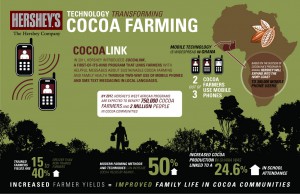 So what does this actually mean? Have we won an important first step or are we being duped?
So what does this actually mean? Have we won an important first step or are we being duped?
*The following sentence was updated on 3/27/2012 for clarification.
Original sentence: Hersheys’ CocoaLink, funded in part by the Bill and Melinda Gates Foundation, is a project that aims to increase yields and productivity on small cocoa farms by introducing new plants, techniques and inputs to small farmers and provide them with real-time advice through a cell phone network.
Updated sentence: According to World Cocoa Foundation Communications Manager Marisa Yoneyama, “CocoaLink is possible through a public-private partnership between The Hershey Company, the World Cocoa Foundation (WCF) and The Ghana Cocoa Board.” In early 2009, the World Cocoa Foundation announced a new, $40 million program funded by the Bill & Melinda Gates Foundation and 14 chocolate industry companies to significantly improve the livelihoods of approximately 200,000 cocoa farmers in Cameroon, Cote d’Ivoire, Ghana, Liberia and Nigeria.
The (cell phone network) idea is that by increasing yields, farmers will have more income and the need for child labor will decrease.But will this work, and how would you know for sure?
Since passage of the Harkin-Engel Protocol over 10 years ago, Global Exchange’s Fair Trade program, along with the Raise the Bar Hershey’s Coalition, has been calling for a code of conduct for suppliers that would ban child labor and put measures in place to enforce such codes. Following Harkin-Engel, the whole chocolate industry committed to ending child labor, forced labor, and trafficking in their cocoa supply chains. A decade later, hundreds of thousands of children continue to labor in hazardous conditions in West Africa, particularly in the Ivory Coast and Ghana, and the US Department of Labor has noted five West African nations whose cocoa may still be tainted by forced and/or child labor.
It’s not clear how increased yields would actually eliminate the worst forms of child labor but monitoring is a good first step. This is the first commitment that Hershey has made to using an independent, third – party certification system to ensure that its cocoa is grown sustainably, including the monitoring of forced and child labor.
This commitment is a welcome first step for Hershey to improve its supply chain accountability and shows that it is responsive to consumer pressure.
You did it!! Your petitions, actions, questions and demands were heard!
This announcement also demonstrates that The Hershey Company acknowledges the severity of the labor abuses that taint the West African cocoa sector, where Hershey’s sources the majority of its cocoa.
Well, Global Exchange has been committed to Fair Trade since its beginning in this country, and we believe that Fair Trade certification is the best way to achieve the goal of supply chain transparency, a fair price for farmers, and the elimination of forced child labor in the production of our chocolate. There is a difference between Rain Forest Alliance Certification and something that is Fair Trade certified.
Fair Trade independent third-party certification addresses poverty, sustainability and empowerment of producers (and workers) in the world’s poorest countries through guaranteed minimum prices plus an additional social premium to be invested in community development. Rainforest Alliance certification, also independent third-party, encompasses all aspects of sustainability as well, but does not offer guaranteed prices, relying instead on the farmers’ capacity to increase yields and efficiency and negotiate for themselves in the global marketplace. According to Rainforest Alliance’s own website:
Fairtrade labelling standards are designed to tackle poverty and empower producers in the world’s poorest countries, giving them a guaranteed price for their products. Rather than emphasizing how products are traded, Rainforest Alliance certification…focuses on how farms are managed.
Increasing yields and efficiency may be a way to increase income temporarily, but without price guarantees it only means more cocoa for Hershey’s. Relying on the market to set prices and farmers’ incomes means that when yields increase, prices will drop. What will the efficiency and higher yields cost in terms of chemical inputs, strain on water resources and natural sustainability? Rainforest Alliance focuses on management rather than workers, on efficiency rather than justice. Hershey’s, you picked the wrong one!
Any model that is not truly sustainable, that chooses short-term gain for individual farmers over community development will not produce the conditions necessary to eliminate trafficking and forced child labor.
So is this a victory or not?
Yes, we should recognize this as a positive step forward but we can’t overstate it or we risk becoming too complacent and leaving the public confused.
Hershey’s has taken a step forward by:
- Responding to consumer pressure and Fair Trade activism: WE have convinced the largest chocolate company in the U.S to change the way it does business!
- Acknowledging the problem.
- Agreeing to third party verification.
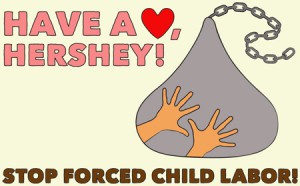 We would like Hershey to continue taking more steps. Yes, we can celebrate. And then get back to work.
We would like Hershey to continue taking more steps. Yes, we can celebrate. And then get back to work.

